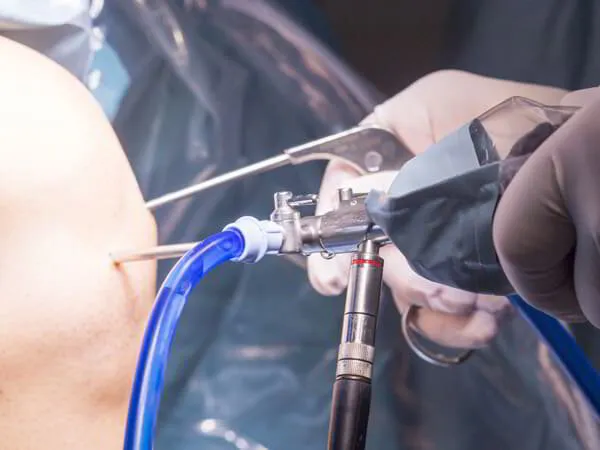Knee Arthroscopy
Home / Area of Specialties / Knee / Knee Arthroscopy
Dr. Pradyumna R carefully evaluate your conditions and symptoms associated to your knee pain and knee injuries, based on the diagnostic report and scan he would suggest if so, you are a candidate for Knee arthroscopy procedure, he is an highly experienced knee treatment specialist provides diagnosis as well as surgical and nonsurgical treatment options at Bangalore Orthopaedic Clinic, in BTM Layout, Bangalore.
If you have any queries or would like to schedule an appointment for Knee arthroscopy procedure or knee pain or knee injury treatment consultation please call +919113025188.
What is Knee Arthroscopy?
Knee arthroscopy is a minimally invasive surgical procedure that allows your surgeon to view the knee joint with a small camera. Your surgeon inserts an instrument called an arthroscope into the knee joint through small incisions in the knee. The surgeon uses this tool to examine the inside of the knee joint and repair or remove damaged tissue. This Arthroscopy procedure is used to diagnose & treating knee injuries such as torn cartilage, joint space lesions, loose bodies in knee joints, osteochondral lesions and treat a wide range of knee problems.
Who requires a Knee Arthroscopy?
If you have knee pain that doesn't go away with rest and other non-surgical treatments, your healthcare provider may recommend arthroscopic knee surgery.
Arthroscopy is a minimally invasive procedure that allows your surgeon to get a better look at cartilage, bones and soft tissues inside of your knee. Your surgeon uses it to diagnose several types of injuries that affect your ligaments and cartilage in the knee joint.
Injuries among athletes are very common. They can happen in contact sports and those that require jumping, running etc.
Although arthritis causes knee pain, arthroscopic knee surgery isn’t always an effective treatment for osteoarthritis.
Why does your surgeon do Knee Arthroscopy?
Your surgeon performs a knee arthroscopy. This procedure allows the doctor to diagnose injuries and repair them. They can remove damaged or inflamed tissue.
The healthcare provider will use a camera to have a close look at your knee. He/she uses the images of damaged tissues and bones to diagnose the injury, plan treatment and finally repair these tissues.
Based on the injuries your surgeon repair soft tissues and bones. They perform repair on ligaments, tendons, or cartilage using specially designed equipment and treat various conditions of the knee. Your healthcare provider can also remove inflamed tissue (such as the synovium) during the procedure.
Talk to your health care provider about all of your options when it comes to treatment.
What are most common conditions treated with Knee Arthroscopy?
The most common conditions treated with knee arthroscopy are soft tissue injuries, fractures, and inflammatory conditions.
Soft tissue injuries are most commonly caused by a sudden movement or direct blow that strains the knee beyond its usual range of motion. 6 Types of Soft Tissue Injuries are Anterior Cruciate Ligament Knee Injuries (ACL), Bursitis, Sprains, Tendinitis, Contusions and Concussions.
Fractures occur when bones break or chip off inside your knee. Pieces of cartilage can sometimes break off when your bone fractures.
Infection and inflammation are two common issues that can occur in your knee joint. Inflammation is called synovitis, and it is caused by the synovium becoming irritated by something such as an injury or infection.
How to prepare for Knee Arthroscopy?
Before you undergo knee arthroscopy. Review a few things to do before your knee arthroscopy surgery, like making sure all of your medications are up-to-date. Be sure to let your health provider know about any other prescription or over-the-counter medications, vitamins, supplements and herbal remedies you have been taking before the procedure. Your health provider will also give you directions for when to stop eating and drinking before your knee arthroscopy, so that you're ready on time and won't need to rush or worry.
Knee arthroscopy is a minimally invasive outpatient surgery to examine the knee joint. It’s done with local anaesthesia, regional anaesthesia or general anaesthesia.
Local anaesthetic, which numbs the area where your surgeon will make small cuts to insert instruments through the skin into the joint space.
Regional anaesthetic or general anaesthetic, depending on how much of your body is numb when the surgery takes place.
How long does it take for arthroscopic knee surgery?
During the knee arthroscopy procedure, your health care provider cleans your leg and leg area. You are administered with anaesthesia. Your provider then irrigates your knee by flushing out the soft tissues and cuts a small hole (incision) in your knee and inserts an arthroscope into it.
The arthroscope has a tiny camera on its tip. A video camera sends images from inside your joint onto a monitor in the operating room where your surgeon can see them. It is used to examine knees with structural, developmental or degenerative tissues, damaged bone or cartilage and remove inflamed tissues. Specialized instruments are used during the procedure that can correct the deficiencies and fix any tears in knee ligaments.
- Realignment of the patella
- Repair or remove of a torn meniscus
- Repair or reconstruction of a torn cruciate ligament
- Removal of tiny torn pieces of articular cartilage
- Removal of inflamed synovial tissue
- Removal of Baker’s cyst
- Removal of loose fragments of bones
Your surgeon will seal each incision with a stitch or steri-strips (tiny adhesive strips), then cover your knee in a comfortable bandage. Braces are sometimes used after surgery to safeguard a repair or reconstruction.
The procedure takes 30 minutes to two hours, depending on your condition.
What to expect after Arthroscopic Knee Surgery?
After arthroscopic knee surgery, your provider may recommend rest and might prescribe medication to help relieve the pain and swelling that may occur after surgery. For a few days, avoid placing any weight on your knee.
For 2-4 weeks after the procedure, you will be required to rest. Once you are comfortable resting with no need for anti-inflammatory medications, you provider may recommend specific exercises or refer physical therapist to beginning with range of motion that target your knee — do them as directed, followed by strengthening, progressive weight bearing, and sports specific exercises such as “cutting” and pivoting. The purpose of these exercises is to prevent soft tissue atrophy (wasting away), maintain range of motion, strengthen muscles, improve proprioception (perception of position) under closed chain conditions (with the leg on), and ultimately prepare you for return to sport and activities of daily living.
What are the advantages of Knee Arthroscopy?
Knee Arthroscopy procedure is performed through small incisions without the need to cut muscle or bone like in traditional (open) surgery. You will likely have less exertion & requires less recovery time, a faster return to daily activities, and improved knee function as you regain strength and range of motion after the surgery.
What are the risks or complications of Knee Arthroscopy?
The complication rate after arthroscopic knee surgery is approximately 1% which are rare according to a 2014 review. If complications occur, they are usually minor and are treated easily. Possible complications after knee arthroscopy include:
- Blood clots
- Infection
- Knee Stiffness
- Swelling or Bruising
How soon after Arthroscopic Knee surgery can you return to normal activities?
Every patient responds differently after surgery with study recover process. Ask your surgeon when you can return to normal activities, including driving and walking without assistance. Some patients may need crutches, a walker, or another device for several weeks after surgery to help support their knee and to protect the repair. Your healthcare provider will provide specific instructions about resuming your daily activities as well as specific sports and physical activity recommendations.
When should you Call your Doctor?
Give yourself time to heal after your surgery. If you notice bleeding, signs of infection, or severe pain that doesn't go away with pain relief medications, call your healthcare provider for further evaluation.
For more information on Knee Arthroscopy or traditional open knee surgery or other knee pain or knee injury treatment options available, please call +919113025188 Dr. Pradyumna R, Orthopaedic knee specialist serving BTM Layout, Bangalore City.

